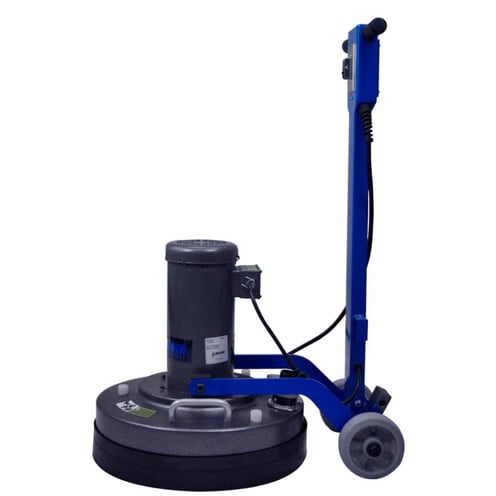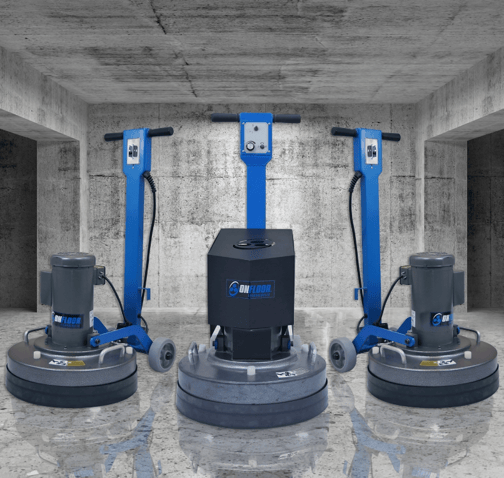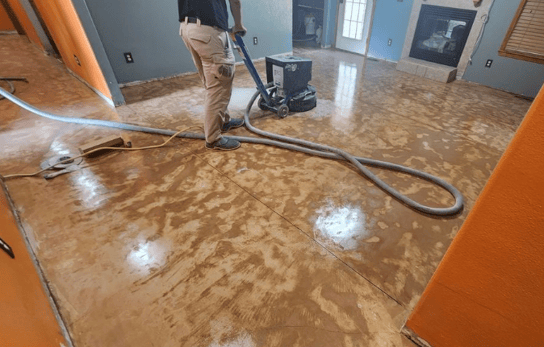Industrial concrete grinders are an integral part of any construction or renovation project. Concrete grinding helps to level, smooth, and shape concrete surfaces to create the perfect finish. Unfortunately, as with all machinery, these tools can sometimes encounter problems or breakdowns that can hinder your project's progress.
As a business owner investing in industrial concrete floor grinders, you must understand some of the most common issues for troubleshooting concrete grinders.
In this article, we discuss the most common issues that can occur with industrial concrete floor grinders and how to effectively troubleshoot them.
Overview of Industrial Concrete Grinders and Their Benefits
Industrial concrete grinders are rotary tools with abrasive or diamond tips that rotate at high speeds to effectively remove coatings from a range of materials, including concrete floors.
They are most commonly used in construction and renovation projects to level, shape, or smooth surfaces and floors before painting or tiling.
There are several benefits of investing in industrial concrete grinders:
- They are fast and effective, meaning projects can be completed quickly.
- They are versatile and can be used on a variety of materials, such as concrete, tile, stone, and wood.
- There is less mess compared to other tools, reducing the need for post-cleanup.
- Their powerful motors remain cool during operation, allowing for long-term use.

Common Issues With Industrial Concrete Grinders and How To Troubleshoot Them
Even though commercial concrete grinders are reliable tools, they can sometimes experience problems that can be difficult to identify or fix. Here, we discuss the most common issues and how to effectively troubleshoot them:
Motor Problems
Signs of Motor Issues
Motor issues with industrial concrete grinders can happen due to overuse or wear and tear. Signs that the motor is not functioning correctly include a grinding noise or reduced power when the equipment is operated at high speeds.
Common Motor Issues
Common motor issues include:
- Wear and tear on the armature or commutator, leading to reduced performance.
- Loose mounting screws in the gearbox, resulting in a rattling noise or a lack of power.
- A buildup of dirt and debris, can interfere with the motor’s cooling system.
How to Troubleshoot Motor Issues
Motor issues can often be addressed by cleaning the grinder and checking for loose screws in the motor. If this does not resolve the issue, a qualified technician should be consulted to inspect and replace any worn or damaged parts.
How Long Can A Motor Last?
When properly maintained, an industrial concrete grinder's motor can last up to 8-10 years. To extend the life of the motor, you must regularly clean and inspect it for any worn or damaged parts.
Grinding Head Problems
Signs of Grinding Head Issues
Grinding head problems can occur due to wear and tear or incorrect usage. Signs that the grinding head is not functioning properly include uneven grinding, a buzzing noise when in use, and excessive vibration.
Common Grinding Head Issues
Common grinding head issues include:
- The grinding wheel has been worn down by excessive use, so it no longer produces a smooth surface finish.
- The grinding wheel is too tight, which can lead to vibrations and a rough surface finish.
- The grinding head is not properly aligned with the material, causing uneven results.
How to Troubleshoot Grinding Head Issues
Grinding head issues can usually be remedied by replacing the worn or damaged grinding wheel. It’s also important to make sure the grinder is properly aligned with the material if you want to avoid uneven results.
Finally, ensure that the grinding wheel is neither too tight nor too loose. This will prevent excessive vibrations or an inferior surface finish.
How Often Should I Replace the Grinding Wheel on My Grinder?
We recommend that you replace the grinding wheel on your industrial concrete grinder every few months, depending on how often you use it.
If the wheel becomes worn down or uneven, it should be replaced as soon as possible to ensure maximum performance and a smooth concrete surface finish.
Clogging Problems
Signs of Clogging Issues
Clogging can occur when your grinder is used on materials that contain a lot of moisture or debris. Signs that the grinder is clogged include a distinctive burning smell and reduced performance when polishing concrete.
Common Clogging Issues
Common clogging issues include:
- The grinding stone has become blocked by dust, dirt, or other debris (such as concrete slurry).
- The grinder is not firmly attached to the material, allowing dust and debris to build up around the grinding head.

How to Troubleshoot Clogging Issues
Clogging problems can often be addressed by cleaning the grinder thoroughly and replacing any worn-down grinding wheels. It is also important to make sure the grinder is firmly attached to the material and that any dust or debris is removed from the floor grinder before use.
Maintenance Tips
Why Regular Maintenance Is Important
Regular maintenance is important to keep industrial concrete grinders running smoothly, including avoiding any breakdowns or malfunctions.
If you want to ensure the longevity of your industrial grinder, you should regularly check and maintain it.
Here are some tips for regular maintenance:
- Clean the grinder regularly to prevent a buildup of dust, dirt, or debris.
- Replace worn-down grinding wheels to ensure smooth and consistent results.
- Check the motor for any loose screws or signs of wear and tear.
- Lubricate the machine regularly to ensure smooth operation and reduce friction.
Proper Cleaning and Storage Tips
In addition to regular maintenance, it is also important to take proper care of the industrial concrete grinder when it is not in use.
Here are some tips for proper cleaning and storage:
- Clean the machine thoroughly after each use to prevent a buildup of dust or debris.
- Make sure that all moving parts are lubricated before storing the grinder.
- Store the grinder in a dry, dust-free environment when it is not in use.
How Often Should I Clean My Industrial Concrete Grinder?
It is recommended that you clean your industrial concrete grinder after each use to prevent a buildup of dust, dirt, or debris. This process will help ensure the longevity of your machine and reduce any clogging issues.
Are There Any Specific Tools I Should Be Using To Clean My Industrial Concrete Grinder?
The best tool for cleaning your industrial concrete grinder is a soft bristle brush. This will help remove any dirt or debris without damaging the floor grinding machine itself. It is also important to use a damp cloth to wipe away any dust or residue.
Overall, avoid using harsh chemicals, as they can damage the metal parts of the grinder.

Benefits of Having a Well-Maintained Grinder for Business Operations
Having a well-maintained industrial concrete grinder is essential for ensuring the safety and efficiency of your business operations. Regular maintenance can help reduce downtime, improve productivity, increase the life span of the machine, and ultimately lead to cost savings.
Investing in regular maintenance also helps extend the lifespan of your machine, meaning you won’t have to replace it as often. This helps to lower the overall cost of ownership and ensures that your grinder is always in top condition when it’s time to use it.
General Safety Tips When Using Industrial Concrete Grinders
When using an industrial concrete grinder, there are certain safety precautions you should take.
Here are some general tips for keeping your workplace safe:
- Wear protective gear such as goggles, gloves, and a dust mask when operating the machine.
- Make sure the grinder is firmly attached to the material before turning it on.
- Use an industrial vacuum to remove concrete dust and debris from the grinding area.
- Do not put your hands near or on the grinder while it is in use.
- Make sure to turn off the machine before making any adjustments or moving it around.
- Unplug the machine when you are done using it.
By following these safety tips, you can ensure that your workplace is safe and that your industrial concrete grinder machines will remain in top condition.
What Should I Do if I Continue to Experience Issues With My Grinder?
If you continue to encounter issues with your industrial concrete grinder, you should stop using the machine immediately and contact a professional for assistance. A qualified technician can help troubleshoot any complex problems and advise you on the best ways to maintain your machine.
Conclusion
Industrial concrete grinders are an essential tool for doing work on a concrete floor, making it essential for any business that works with concrete. These tools can help achieve a smooth, precise surface finish and make quick work on large projects.
With proper maintenance and usage, your grinder will remain in top condition and provide consistently reliable results. By following the advice outlined above, you can ensure that your industrial concrete grinder is always in top condition and ready for commercial use.
0 comments